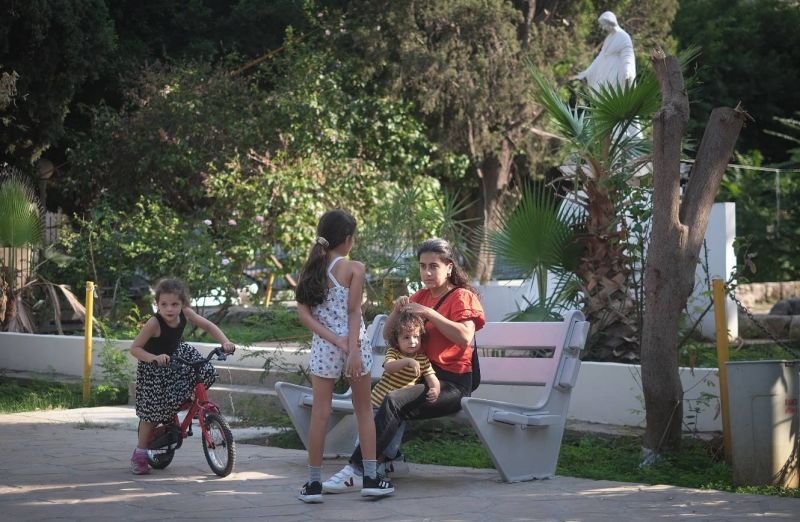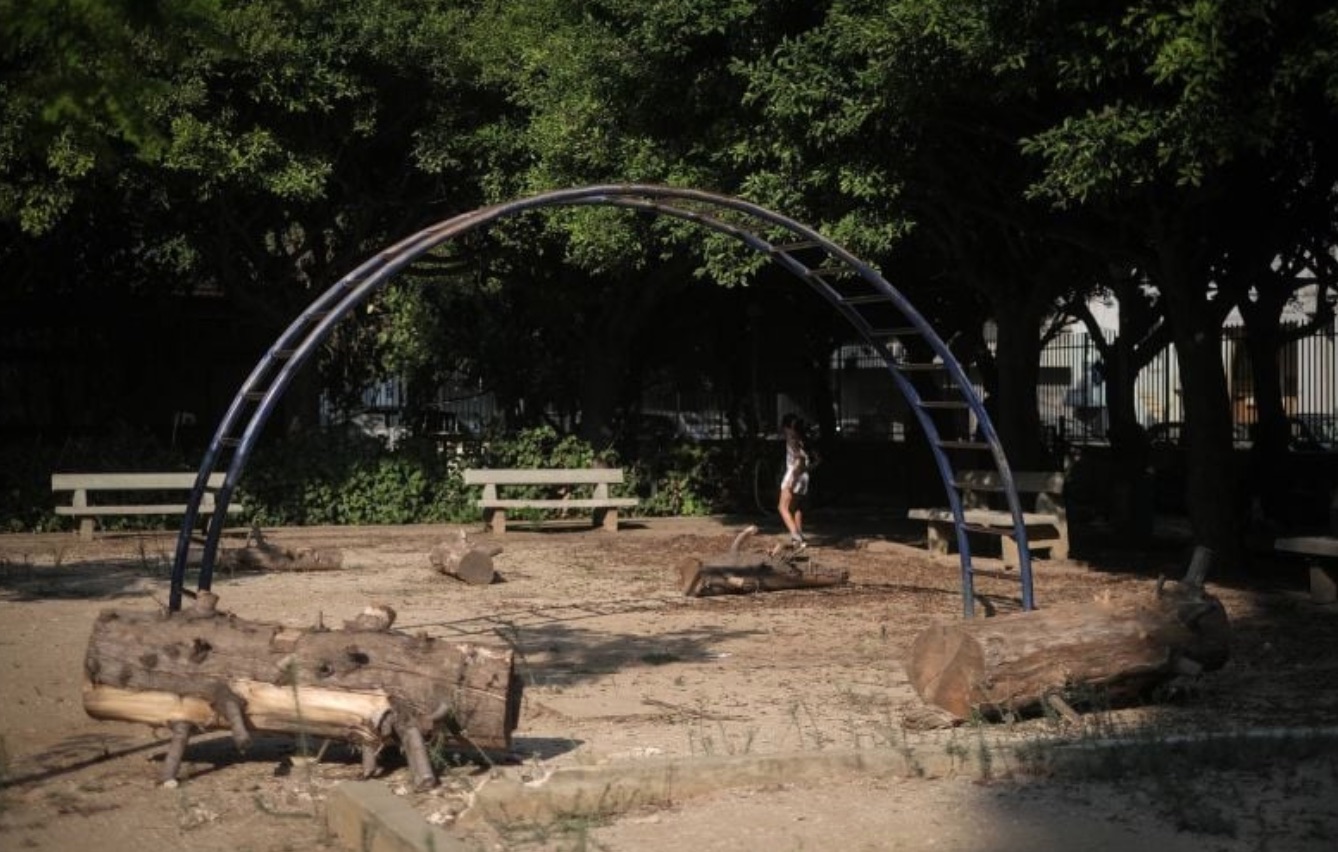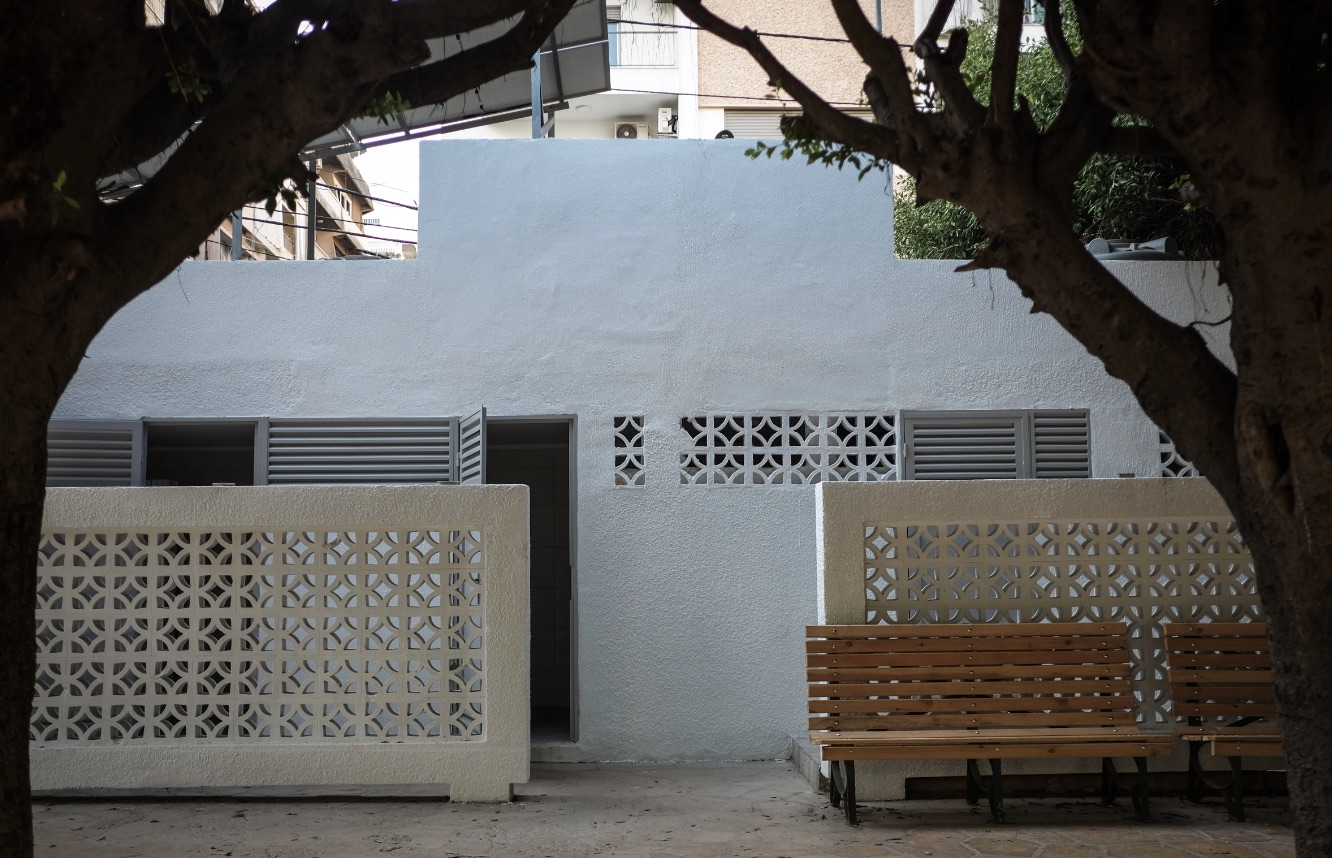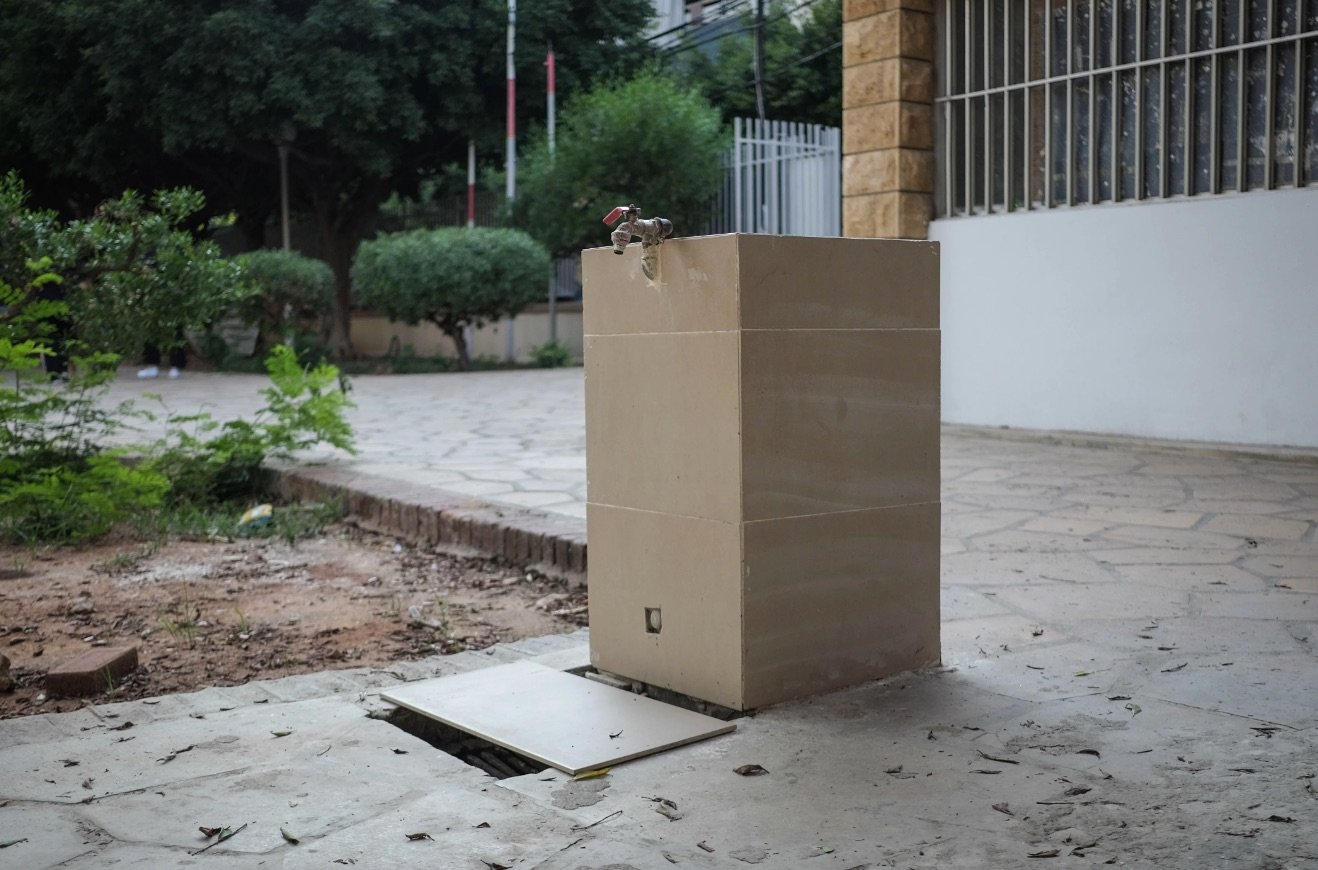
A family enjoys an afternoon at the garden. (Credit: Joao Sousa/L'Orient Today)
At the Jesuit garden in Achrafieh’s Geitawi neighborhood, Feiruz songs played as neighborhood residents, mostly elderly, lounged on benches and enjoyed the day. The historic garden, which contains the Al-Sabil public library and the ruins of a 4th-century basilica, has been the subject of continuous controversy for the past two years.
Renovations of the park, which were restarted in March, were interrupted again by angry Geitawi residents who feel their space is being violated by Beit el Baraka, a well-known charity that is in charge of the project.
“After the explosion in Beirut in August 2020, we rehabilitated some of the buildings in this neighborhood [Geitawi] and the renovation of the garden is part of this framework,” explained Maya Ibrahimchah, Beit el Baraka president and founder.
Besides the tree pruning which was entrusted to a botanist, the rehabilitation project was designed and carried out by the NGO and funded by private donors. Since the start, Ibrahimchah has faced many controversies around the project.
 The sandbox play-pit at the Jesuit Garden has been a particular subject of conflict between residents and the NGO. (Credit: Joao Sousa/L'Orient Today)
The sandbox play-pit at the Jesuit Garden has been a particular subject of conflict between residents and the NGO. (Credit: Joao Sousa/L'Orient Today)
About two months ago, Youssef Karam, a local resident and member of the collective of Geitawi residents opposing the works, began to list what he called deficiencies in the renovations and decided to “take actions.”
Residents have drawn up a long list of complaints. They claim water leaks in the renovated restrooms, the white walls of which do not match the rest of the garden, and that the original yellow stones of the garden’s emblematic fountains were replaced by ceramic tiles. These are just a few of the “unforgivable execution errors,” Karam listed.
The collective of aggrieved Geitawi residents is backing its arguments on a study carried out by Habib Sayah, an architect who owns a house near the garden and holds a Ph.D. in architectural conservation from Geneva. Sayah made his own recommendations for “the rehabilitation of the garden.”
The members of the collective claim to have collected 250 signatures registered with Beirut Governor Marwan Abboud, in favor of “repairing the damage and restoring the garden to its original state.”
Works ‘far from finished’
“We’re being blamed for execution errors when we’re far from finished,” said Ibrahimchah. She says the collectives members “threw the team out of the garden [using] force, shouting and insults.”
Karam confirmed having asked Beit el Baraka’s team to leave the garden but denied using violence. “We had no choice, given the errors we were seeing on the ground,” he said.
A source at the Beirut Municipality told L’Orient-Le Jour that Beit el Baraka's forced expulsion from the garden was “illegal,” and affirmed that the renovation project was entrusted to the association under an agreement with Beirut Governor Marwan Abboud, who “intends to take strict measures" in response to the harsh actions against the NGO.
Speaking to us about the criticisms, Beit el Baraka’s team acknowledged an error regarding the fountains ”which will again be covered with stones similar to the originals,” and stated that works regarding the benches, the painting of the fence, and other matters, were interrupted, hence the impression of unfinished business.
The above-mentioned municipal source confirmed that the works are still in their early stages and noted that water tanks and solar panels have also been installed.
Syrian refugees
The sandpit, which serves as a playground in the middle of the garden, is one of the major concerns of the collective. “We’ve discovered that Beit el-Baraka is planning to replace this sand with concrete,” said Marie-Claude Hage, a member of the dissenting group. She pointed to sketches of two different blueprint plans for that part of the garden she claims were provided by Beit el Baraka.
Ibrahimchah denied planning to fill the play area with concrete. “What the residents have mistaken for concrete on the sketches is new sand that will replace the old sand, with a protective base so that the children don’t get hurt,” she said.
“We can’t wait to get this never-ending controversy over with. So we’ve abandoned the plans we had drawn up, and from now on we’ll just have to overhaul and clean up this part of the garden,” she added.
Residents argue the real aim of modernizing the playground is to develop the space for Syrian refugee families, rather than for local residents. They pointed to the fact that Beit el Baraka has entered into a partnership with CatalyticAction, a charity that has carried out projects for Syrian refugees.
“What is behind this project, in a garden that symbolically belongs to its residents? Why are we concentrating on the development of this playground as if it concerned the whole garden?” asked Karam.
“But why should it be the modernization of the garden that attracts Syrian children in particular? They go to the gardens in any case,” retorted the municipal source.
 Residents criticized the color choice of the renovated bathrooms. (Credit: Joao Sousa/L'Orient Today)
Residents criticized the color choice of the renovated bathrooms. (Credit: Joao Sousa/L'Orient Today)
Ibrahimchah noted that Beit el Baraka has never carried out projects specifically aimed at Syrian refugees. While denying that there was any ulterior motive in the partnership with CatalyticAction (which, according to her, does not focus on working with Syrian refugees either), she pointed out that the partnership was broken off to put an end to the quarrel.
Multiple plans
“The people living around the garden, who have been involved in a dialogue since the start of the project, don’t agree on anything,” said Ibrahimchah.
Meanwhile Hage believes “the NGO claims to want dialogue, but then backs down as soon as we oppose anything.”
Two years ago when the project started, it looked very promising. It extended a hand to the community and organized dialogue around the small 4,400 m² garden, which has been a municipal asset since the 1960s and was bequeathed by the Jesuits.
A few years ago, the Jesuit garden escaped a municipal project aiming to replace it with a 700-space underground car park. The local council at the time proposed recreating the garden above the car park, and bringing back the remains of the basilica. Opposition from local residents brought the project to a halt in 2017.
Jihad Kiameh, an urban architect, planner and teacher who spearheaded the opposition to the old car park project, is himself a local resident with no links to the above-mentioned collective.
In 2021, when the project to renovate the garden was put on the table, Beit el Baraka asked Kiameh’s agency to draw up an initial renovation plan. This plan, which proposed a radical modernization of the space, was eventually abandoned by the association following strong opposition, particularly from other architects in the neighborhood.
In his agency, which is close to the garden, Kiameh proudly showed us the plans for this aborted project, which included the creation of an “agora,” a large open central area between the basilica and the library to host various activities, as well as a more modern library, and a suspended ramp to add a space for walking.
 The yellow tiles of the fountains were replaced with ceramic tiles. (Credit: Joao Sousa/L'Orient Today)
The yellow tiles of the fountains were replaced with ceramic tiles. (Credit: Joao Sousa/L'Orient Today)
“The project was presented at a dialogue session to which all the stakeholders were invited,” he said.
Kiameh, who regrets “this missed opportunity,” is critical of the stage the work has reached. “There has been a lot of hesitation, delays, changes of plans and subsequent construction errors, all of which has seriously undermined the trust between Beit el Baraka and local residents,” he said.
“The association must complete the work quickly and to the highest professional standards,” he concluded.
This article was originally published in French in L'Orient-Le Jour. Translation by Joelle El Khoury.